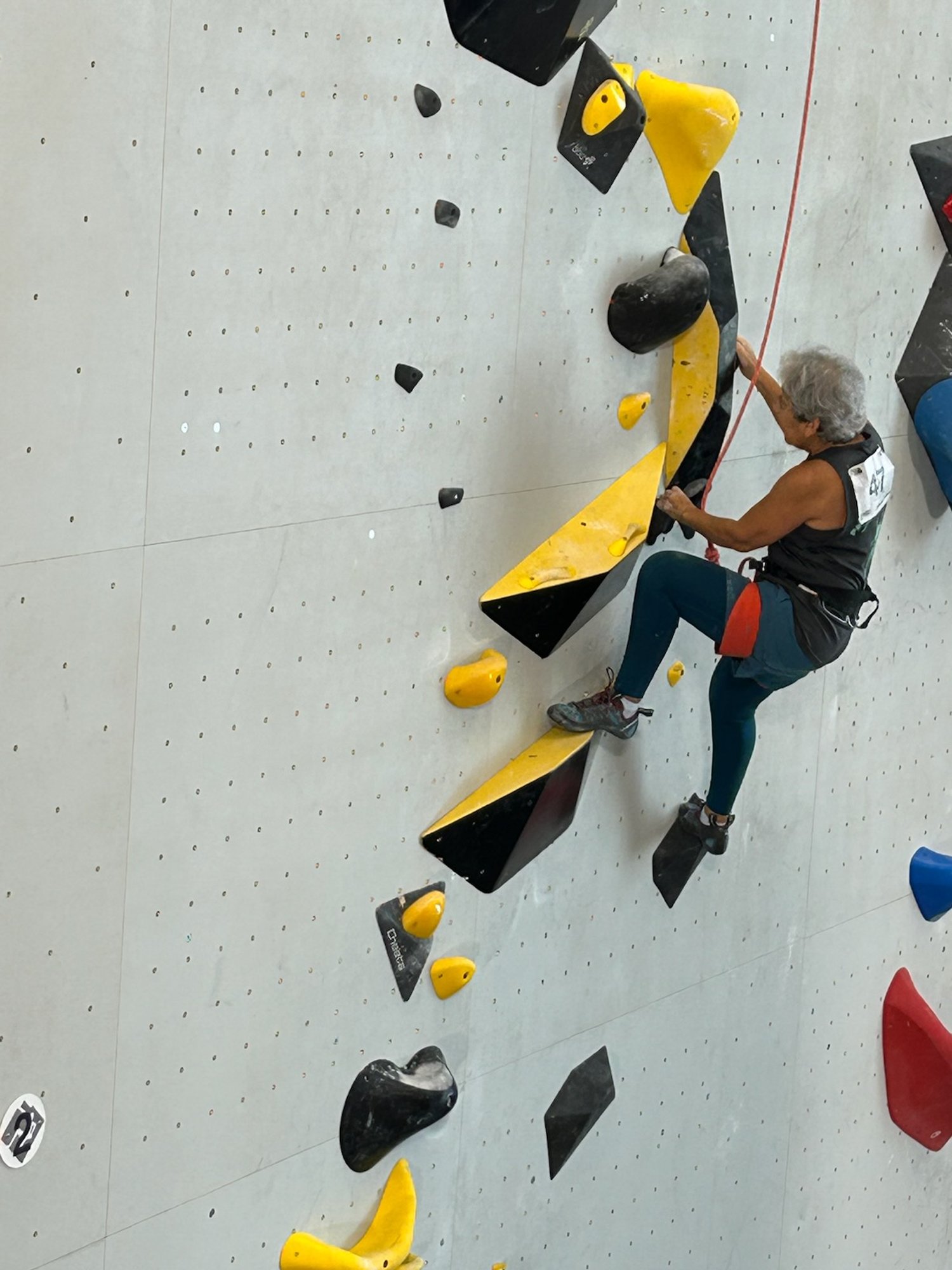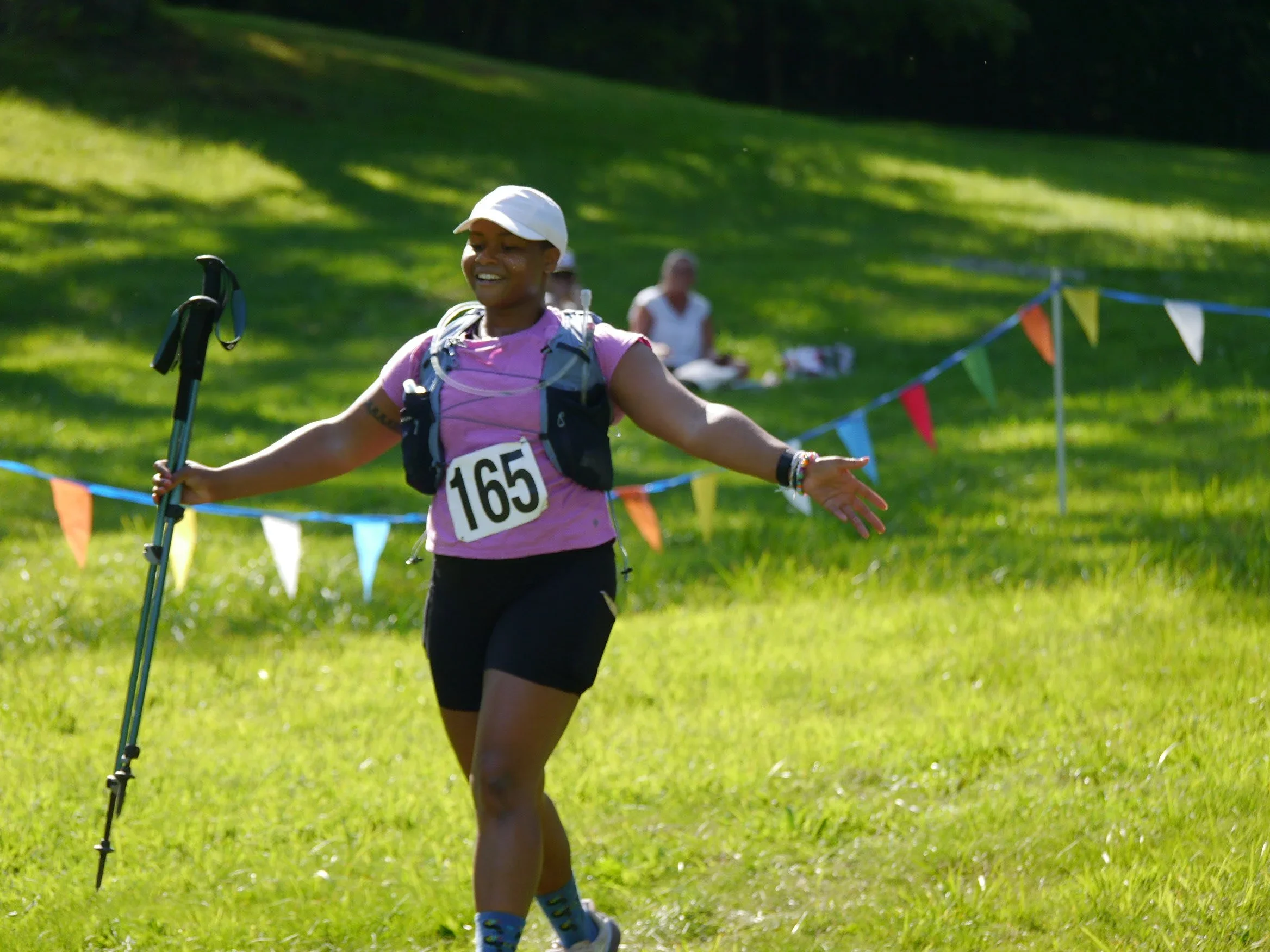Life after Parkinson's: How My Salvadoran Immigrant Mother Became a Rock Climber in Her 60s
Teresa Bennett, the author's mother, climbs at Carderock Recreation Area in Maryland with the Up Ending Parkinson's crew.
"I never thought I'd be a rock climber at 68," Mom laughed. "But here I am, having more fun and growing stronger than I could’ve imagined. If I can do this, anyone can."
When my Mom, a Salvadoran immigrant, was diagnosed with Parkinson's disease (PD) at 65, I never imagined that a year later, she'd be scaling 60-foot walls with the grace and determination of a seasoned climber. Hers is a story of resilience, community, and the unexpected joy found in facing challenges head-on.
Nearly a decade before the diagnosis, Mom began experiencing mysterious symptoms: migraines, stiffness in her left hand, occasional tremors, and a slight drag in her left foot when she walked. Doctors diagnosed her with benign familial tremors and chronic migraines. We watched, worried, as these symptoms progressed over the years.
Then, in 2020, Dr. David Whitney at INOVA Neurology delivered the news we did not want to hear: Mom had Parkinson's disease.
The diagnosis hit like a freight train. My vibrant, 64-year-old Mom was facing a future of staggering uncertainty. The fear in our family was palpable, and for a while, we simply had to mourn as she began medication to treat Parkinson’s.
An Unexpected Lifeline
But my Mom is a relentless problem-solver, always ready to act. So when Dr. Whitney's office organized a support group for people with Parkinson's, my Mom asked for resources and received a podcast recommendation that would change everything. The podcast episode discussed how rock climbing could be a safe, beneficial exercise for folks with Parkinson's.
My Mom immediately shared the podcast episode with our family, and we were immediately intrigued. The harness and rope system in indoor climbing gyms provides a safety net, eliminating the risk of falls. Plus, the problem-solving and strength-building aspects of climbing could potentially slow the progression of PD symptoms.
Feeling hopeful, we decided to give Mom a couple rock-climbing lessons for Mother's Day 2021. Little did we know that this gift would become a turning point in her Parkinson's journey.
The First Send
Teresa competes in the 2024 USA Climbing Paraclimbing National Championships at Sportrock in Maryland.
We reached out to Sportrock, a local climbing gym in Virginia, and connected with their events director and climbing instructor Molly Donelan. Coincidentally, Molly was the guest speaker on that fateful podcast episode that had sparked our interest — she’d been leading an informal rock-climbing group for people with Parkinson’s for years already, organizing volunteer belayers and working with Sportrock to provide this opportunity free of charge.
From my Mom’s first interaction, Molly’s passion for helping people with Parkinson's through climbing was evident. For Mom's first lesson, Molly started her on a short, 25-foot wall. Even with the safety harness, Mom was apprehensive.
But as she slowly made her way up the wall, something remarkable happened. The focus required to find each handhold seemed to quiet her tremors. Her movements, usually stiff, became more fluid.
By the end of that first session, Molly had Mom tackling a 40-foot wall. Mom conquered those initial fears and got totally hooked on rock climbing.
A New Climbing Community
Mom joined Molly's group of climbers with Parkinson's, who meet multiple times a week. Some are full-time wheelchair users due to tremors. Some are new parents in their 40s. All are hard-charging climbers.
My Mom’s transformation was incredible to witness. Not only was Mom getting stronger physically, she was also forming deep friendships with her fellow climbers.
"Since I started climbing at Sportrock with a group of people living with Parkinson's, I am stronger, happier, and healthier than ever before," Mom said. "I very much enjoy the community and friendships among us."
This tight-knit community extends beyond the gym walls. Some of the climbers even attended Molly's wedding in October 2021!
And when they are at the gym, they’re pushing each other in the best ways. My Mom even competed in the 2024 Paraclimbing National Championships at Sportrock’s newest location in Rockville, Maryland.
Physical & Mental Benefits
Teresa climbs at Sportrock climbing gym in Virginia during an Up Ending Parkinsons group climb session.
The physical improvements were noticeable almost immediately. Mom's left hand, once stiff and often stuck in a cupped position, began to relax and strengthen. Her tremors became less pronounced, and her gait improved significantly. No more dragging left foot — now she walks with big, confident steps. Dr. Whitney had been planning to increase my Mom’s medication that year, but after seeing how her symptoms had subsided after she started climbing, he postponed those dosage plans.
Perhaps even more impressive were the mental health benefits. The fear and anxiety that had clouded Mom's outlook since her diagnosis began to lift. "Before rock climbing, I used to be very scared about my future with Parkinson's, and now I don't think about it as much," she shared. "I feel that as long as I can rock climb, I will be fine."
This newfound confidence and fervor for climbing spilled over into other areas of her life. Mom took up swimming and Pilates to complement her climbing. She and my Dad also teamed up with Molly to turn the informal climbing group into a 501(c)(3) nonprofit: Up Ending Parkinsons.
Up Ending Parkinsons provides guided rock climbing — both at indoor climbing gyms and outdoor crags — for people living with Parkinson's disease all over the United States.
My Mom particularly loves climbing at Carderock Recreation Area in Carderock, Maryland.
The Science Behind the Success
While Mom's story might seem like a miracle, there's science backing up the benefits of exercise — especially challenging, novel activities like rock climbing — for people with Parkinson's.
Many assume correctly that rock climbing is a great low-impact cardio workout that also strengthens your muscles. Few exercises rival rock climbing in terms of the sheer number of muscles required. But what many people don't know is how impactful rock climbing can be for brain health.
Studies show that skilled sports — like rock climbing — can strengthen your motor cortex plasticity, which makes it an excellent sport for people living with Parkinson's disease. This is crucial because Parkinson's affects the motor cortex, the area of the brain responsible for planning, control, and execution of voluntary movements.
Getting to the top of a climbing wall requires a high level of exertion, which is also proven to be important in Parkinson's disease therapy. The physical challenges of climbing, along with the mental planning needed, make it a perfect therapy. Here's how rock climbing specifically benefits people with Parkinson's:
Balance and Coordination
Navigating a climbing route challenges the body's proprioception (awareness of body position), which can help improve balance – a common issue for PD patients.
Cognitive Stimulation
Planning moves and solving the "puzzle" of a climbing route provides excellent cognitive exercise, potentially helping with the cognitive symptoms of PD.
Strength Training
Climbing is a full-body workout that builds strength in core muscle groups, which can help with posture and stability.
Dopamine Release
Like other forms of exercise, climbing can stimulate the release of dopamine, the neurotransmitter that's depleted in Parkinson's disease.
Stress Reduction
The focused nature of climbing, combined with the sense of accomplishment, can help reduce stress and improve mood.
Motor Cortex Plasticity
As mentioned earlier, rock climbing can increase and strengthen motor cortex plasticity, potentially helping to compensate for the neurological changes caused by Parkinson's.
Posture Improvement
Studies have shown that therapeutic climbing can improve posture in Parkinson's patients, which is often affected by the disease.
Overall, research in this area is ongoing and promising. Several studies have demonstrated the effectiveness of rock climbing as a therapeutic intervention for Parkinson's disease:
These studies provide scientific backing to what we've observed in Mom's journey — that rock climbing can be a powerful tool in managing Parkinson's symptoms and improving quality of life.
Communities of Color Facing Parkinson’s
While Parkinson's affects people of all backgrounds, research has shown that it can disproportionately impact communities of color. Black and brown Americans are less likely to be diagnosed with PD, possibly due to reduced access to healthcare and specialist neurologists. Delayed diagnoses often lead to worse outcomes.
Moreover, people of color are often underrepresented in PD research studies, which can lead to gaps in understanding of how the disease affects different populations.
By raising awareness about both the challenges of PD and the potential benefits of activities like rock climbing, more people — especially in underserved communities — might have the chance to seek early diagnosis and explore innovative ways to manage their symptoms.
What Would Teresa Do
Consider lessons from my Mom’s experience:
Don't let fear stop you.
It would have been easy for Mom to retreat into herself after her diagnosis. Instead, she chose to face her fears head on.
Stay open to new ideas.
Who would have thought that rock climbing could be so beneficial for someone with Parkinson's? Sometimes, the most effective treatments come from unexpected places.
Community is crucial.
The support and camaraderie Mom found in her climbing group have been just as important as the physical activity itself.
It's never too late.
Mom started rock climbing at 65 after a life-changing medical diagnosis. Age is just a number when it comes to challenging yourself and growing. Plus, she experienced Parkinson’s symptoms for years before she received a definitive diagnosis, and rock climbing has still improved many of those symptoms since she started.
Movement is medicine.
The impact of regular, challenging physical activity on Mom's symptoms has been nothing short of remarkable.
Climb On
As we celebrated the three-year anniversary of Mom's first climbing lesson this year, there was a shared sense of gratitude and hope. Parkinson's is still an undeniable part of my Mom’s life and our family’s life, but it does not define her future.
Instead of only fearing what's ahead, she's planning her next climb, finessing her technique, and inspiring others to see how rock climbing can keep their PD in check.















The outdoors can be a dangerous place and fear might initially keep you from trying new things. So here are four reasons why you should do it scared.